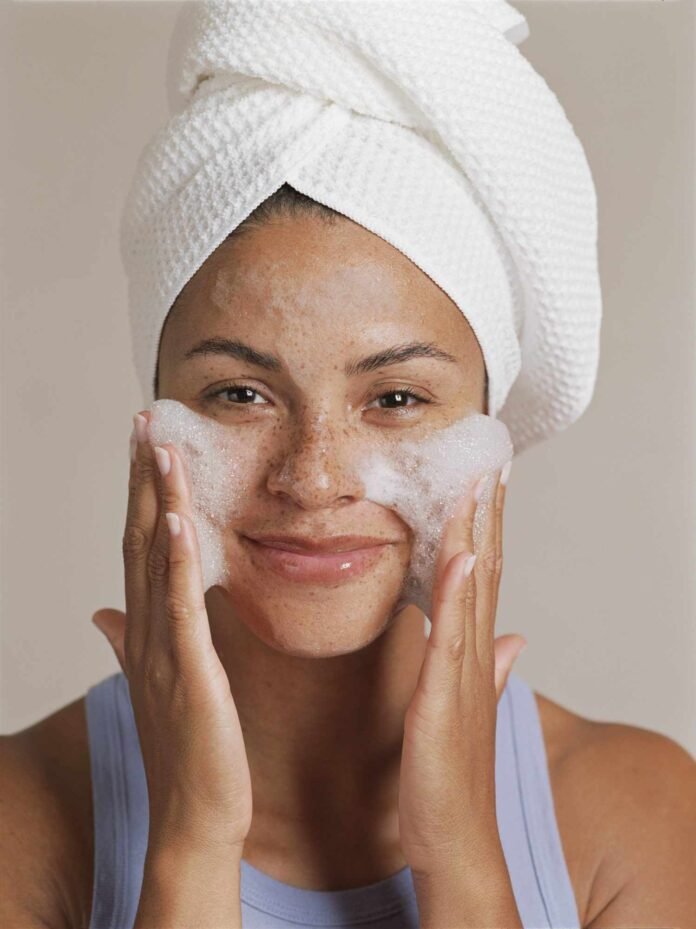Skincare experts emphasize the importance of proper hydration to maintain healthy and radiant skin. While many may mistake dehydrated skin for dryness, it’s crucial to understand that they are distinct conditions that require different approaches to treatment. Interestingly, individuals may experience both dehydrated and dry skin simultaneously, necessitating tailored skincare routines.
Experts recommend several tips to effectively hydrate the skin and address dehydration concerns. Firstly, increasing water intake is paramount in hydrating the skin from within. Staying properly hydrated not only benefits overall health but also helps replenish moisture levels in the skin, promoting a plump and youthful complexion.
In addition to staying hydrated internally, incorporating hydrating skincare products into one’s routine is essential. Opting for moisturizers and serums containing ingredients like hyaluronic acid, glycerin, and ceramides can help lock in moisture and prevent water loss, thereby combating dehydration and dryness.
Moreover, experts advise against over-cleansing the skin, as harsh cleansers can strip away natural oils and exacerbate dehydration. Instead, opt for gentle, hydrating cleansers that effectively cleanse the skin without compromising its moisture barrier.
Another important aspect of hydrating the skin is exfoliation. Regular exfoliation helps remove dead skin cells and allows hydrating products to penetrate more effectively, promoting a smoother and more hydrated complexion.
Furthermore, incorporating hydrating face masks into one’s skincare routine can provide an extra boost of moisture and nourishment to the skin. Look for masks containing ingredients like aloe vera, honey, and cucumber, known for their hydrating and soothing properties.
Protecting the skin from environmental aggressors is also crucial in maintaining hydration levels. Sunscreen should be worn daily to shield the skin from harmful UV rays, which can contribute to dehydration and premature aging.
Lastly, adopting healthy lifestyle habits, such as getting adequate sleep, managing stress levels, and maintaining a balanced diet rich in fruits and vegetables, can also contribute to skin hydration and overall skin health.
Furthermore, it’s essential to pay attention to the environmental factors that can contribute to skin dehydration. For instance, exposure to harsh weather conditions like cold winds and low humidity levels can strip the skin of its natural moisture, leading to dehydration. In such cases, using a humidifier indoors can help maintain optimal humidity levels and prevent moisture loss from the skin.
Moreover, lifestyle factors such as smoking and excessive alcohol consumption can also have detrimental effects on skin hydration. Both smoking and alcohol can deplete the skin’s natural moisture and impair its ability to retain water, resulting in dryness and dehydration. Therefore, quitting smoking and moderating alcohol intake can significantly improve skin hydration levels.
Additionally, incorporating foods rich in essential fatty acids, antioxidants, and vitamins into your diet can promote skin hydration from within. Foods like fatty fish, avocados, nuts, and seeds contain omega-3 fatty acids and vitamins E and C, which help maintain the skin’s moisture barrier and protect against free radical damage. Similarly, staying hydrated by drinking water and consuming hydrating foods like cucumbers, watermelon, and celery can also contribute to skin hydration.
Incorporating a regular skincare routine that includes hydrating products tailored to your skin type is crucial for maintaining skin hydration. For individuals with dry or dehydrated skin, using a gentle cleanser followed by a hydrating toner can help replenish moisture and prepare the skin for subsequent skincare products. Additionally, incorporating a hydrating serum or essence containing ingredients like hyaluronic acid and glycerin can provide an extra boost of hydration to the skin.
Furthermore, applying a moisturizer suitable for your skin type is essential for sealing in moisture and preventing water loss throughout the day. Look for moisturizers formulated with emollients and occlusives like shea butter, squalane, and petrolatum, which help create a protective barrier on the skin’s surface and lock in moisture.
Regular exfoliation is also crucial for maintaining skin hydration. Exfoliating removes dead skin cells that can accumulate on the skin’s surface, allowing hydrating products to penetrate more effectively. However, it’s important to choose gentle exfoliants that won’t strip the skin or cause irritation, especially for individuals with dry or sensitive skin.
Lastly, incorporating hydrating face masks into your skincare routine once or twice a week can provide an intensive moisture boost and address specific skin concerns. Look for masks containing ingredients like hyaluronic acid, aloe vera, and honey, which can help hydrate, soothe, and nourish the skin.

